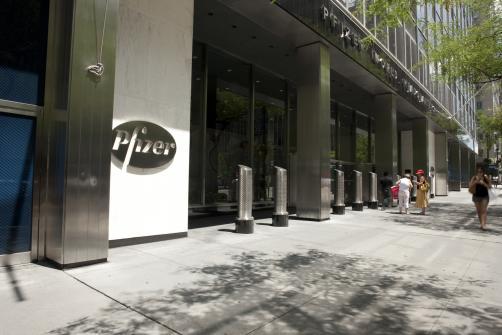
Pfizer revenue drops, but new cancer drugs shine
pharmafile | July 29, 2014 | News story | Research and Development, Sales and Marketing | Cancer, Inlyta. axitinib, Lipitor, Lyrica, Pfizer, Q2, Sutent, viagra
Pfizer saw a 2% drop in sales for the second quarter but has pointed to the stellar growth of its new oncology pipeline as a reason to celebrate.
Total sales across the US firm fell 2% to $12.7 billion, hurt predominately by declines for generic medicines for off-patent drugs, such as the continuing slide of erectile dysfunction drug Viagra (sildenafil) and its statin Lipitor (atorvastatin).
Viagra, which has lost most of its patents in Europe but won’t do in the US until 2019, recorded a 28% drop in sales outside the US.
Meanwhile Lipitor revenue dropped to just $543 million for the second quarter – a far cry from the $13 billion a year it was bringing in at its peak.
Its pain pill Lyrica (pregabalin), Pfizer’s top seller last year, saw revenue climb 16% to $1.3 billion. Prevnar, a vaccine for pneumococcal diseases, also saw healthy growth of 13%, up to $969 million.
But revenue declined in the company’s largest segments, namely global innovative pharmaceuticals and global established pharmaceuticals, by around 5% and 6%, respectively. Total sales for the past six months also dropped by 5 per cent.
The global vaccines and consumer health care units, however, posted growth of about 13% and 14%, respectively.
Overall the firm still managed to exceed Wall Street’s revenue expectations, which predicted sales worth $12.46 billion.
Ian Read, chairman and chief executive of Pfizer, says: “I continue to see Pfizer as well positioned to effectively execute on our strategy to further strengthen each of our businesses on a global basis and deliver value to all of our stakeholders.”
AstraZeneca deal
Despite the dip in sales, analysts were mainly happy with the firm’s results, especially after it was rebuffed by AstraZeneca less than two months ago as it attempted a $118 billion mega-merger with the Anglo-Swedish company.
The intention behind the merger was to give Pfizer a broader pipeline, notably for immune-oncology, and help cut its tax status by moving its HQ to the UK, where it will pay less than in the US. The UK has a corporate tax rate of 21% compared to the US’s 35 percent.
The firm has been down the mega-merger route before with its 2009 acquisition of Wyeth for $68 billion.
Then, as now, the firm wanted to ease off its reliance on the world’s once biggest selling drug Lipitor, which has since gone off patent with nothing in its pipeline to replace the lost revenue.
Outside of M&A deals it has internally turned to cancer drugs and in recent years has been building up a small but impressive oncology pipeline; these latest results show that this pharmaceutical section is starting to deliver for the firm and will contribute heavily toward its future growth.
Its new lung cancer treatment Xalkori (crizotinib) brought in $108 million in sales, up 67% as it continues its trajectory toward a potential blockbuster status.
Its latest lung cancer medicine Zykadia (ceritinib) was approved in late April in the US, but no sales have yet been recorded given its recent launch.
But analysts see the drug as generating annual peak sales of around $1 billion by 2020, putting it firmly into the blockbuster bracket.
Meanwhile, its new kidney cancer treatment Inlyta (axitinib) also saw sales rise by 71% to $101 million after launching in the US late last year.
This is looking to become the next gen version of Pfizer’s older kidney cancer drug Sutent (sunitinib), which made $310 million this quarter, a drop of 1% as other treatments in this area begin to make up ground on the drug.
Pfizer says that is research and development spending also rose 13% to $1.7 billion, primarily on the back of funding new cancer medicines.
Sales in the balance
It was “overall, a decent/good quarter, and certainly an improvement” from the first quarter, Mark Schoenebaum, a New York-based analyst with ISI Group LLC, writes in a note to clients.
He adds that Pfizer will get a “re-boot opportunity during which the company can clarify its go-forward strategy after a difficult year thus far”.
Pfizer says it is now lowering its revenue outlook for the year, pointing to the looming generic competition for blockbuster painkiller Celebrex (celecoxib) which will begin in December this year, according to the firm.
It is currently Pfizer’s third biggest selling medicine, making $762 million this quarter, up 7 per cent on this time last year.
The company now expects total sales for the year to be reach between $48.7 billion to $50.7 billion, down from its previous range of $49.2 billion to $51.2 billion.
The firm could seek further talks with AZ as soon as next month, should the company’s shareholders be open to a new deal. If not, it will need to wait another three months before making another bid.
Ben Adams
Related Content

NHS accepts Pfizer’s tafamidis for ATTR-CM treatment
NHS England has announced that it has accepted Pfizer’s drug, tafamidis, for the treatment of …

Pfizer’s Beqvez approved by FDA for haemophilia B treatment
Pfizer has announced that the US Food and Drug Administration (FDA) has approved Beqvez (fidanacogene …

EC approves Pfizer’s Emblaveo for multidrug-resistant infection treatment
Pfizer has announced that the European Commission (EC) has granted marketing authorisation for Emblaveo (aztreonam-avibactam) …







